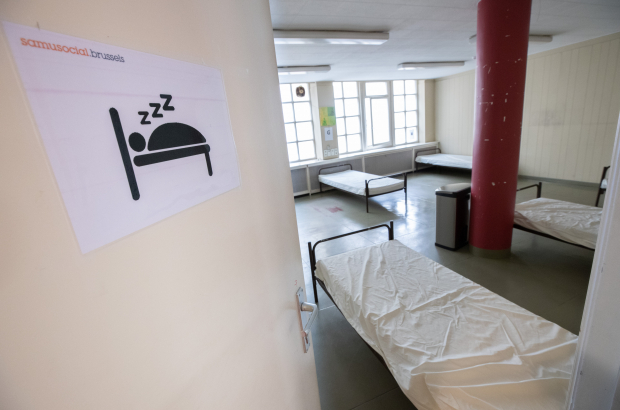- Daily & Weekly newsletters
- Buy & download The Bulletin
- Comment on our articles
Brussels increases shelter places for homeless but shortfall remains
As of 1 December, there will be 3,224 places in shelters available to homeless people in the Brussels region. That's more places than ever before and more than 1,000 more places than last year.
However, the number is still not enough. Doctors of the World announced on Tuesday that there are still 800 too few places for homeless people in the region, despite the recent increase in capacity.
"Living on the streets has a direct impact on health and there are still at least 800 places in Brussels missing," Doctors of the World, which advocates for a right to health for all, said. “Faced with ever-decreasing temperatures, homeless people suffer from difficult access to food, day centres and healthcare.”
With the coronavirus restrictions and curfew extended until 13 December in Brussels and temperatures starting to drop sharply, Doctors of the World is concerned about the deterioration of the health of homeless people. COVID-19 has worsened the situation among homeless people who have to fight for places in overcrowded shelters and no longer have access to the food they could get, for example, from the surpluses of restaurants and cafes which are currently closed.
"It is essential to be able to welcome all homeless people into shelters to reduce the risk of the spread of the virus, detect contamination early and be able to take the necessary measures in terms of management, isolation and follow-up contacts," stressed Michel Genet, director-general of Doctors of the World Belgium.
The latest census in 2018 estimated that more than 4,000 people were homeless or poorly housed in Brussels. Since homelessness has a strong physical and psychological impact on those who suffer from it, the lack of shelter places has a direct impact on the health of these people. When they are vulnerable, they find it difficult to heal themselves. "Everyone has a right to health: whether they are migrants or homeless people, sex workers, or drug users," concluded Genet.
Meanwhile, environment minister Alain Maron, while not denying this shortfall in shelter places, pointed out that Brussels is already making more effort to house the homeless than it ever has. "From next week there will be 3,224 reception places, distributed among all organisations and institutions," the minister explained in response to the Doctors of the World statistics. "That's more than we ever did and over 1,000 more places than in 2019." This figure includes the capacity of emergency centres, shelters, hotels and COVID-19 isolation facilities.
He revealed that the budget for tackling homelessness will increase by more than €5 million next year, after growing by almost €15 million in 2020. "The Region has never invested so much in its homelessness policy," the minister said.
Maron also stated that not only are there more places, but they are also of better quality. "People are no longer shown the door at 9am, but can stay around the clock, for 24 hours. This makes it easier, for example, to help them, whether it is medically, psychologically or socially."
The Brussels Capital Region not only focuses on shelter, but also tries to help homeless people find a permanent home of their own and reintegrate into society through its ‘housing first’ programmes. This concept means that people first get a modest home and are then further supervised. The number of residents in ‘housing first’ doubled this year, rising to 200, and should continue to increase next year. The region aims for 400 ‘housing first’ residents by the end of the legislature.
"Ideally, of course, we would include many more people in the ‘housing first’ programmes," said Maron. "But the biggest difficulty is not the budget, but finding enough of those affordable small homes for people to live in. Ex-homeless people must be able to pay for it themselves, for example from a benefit. And that kind of housing is not readily available in Brussels."


















